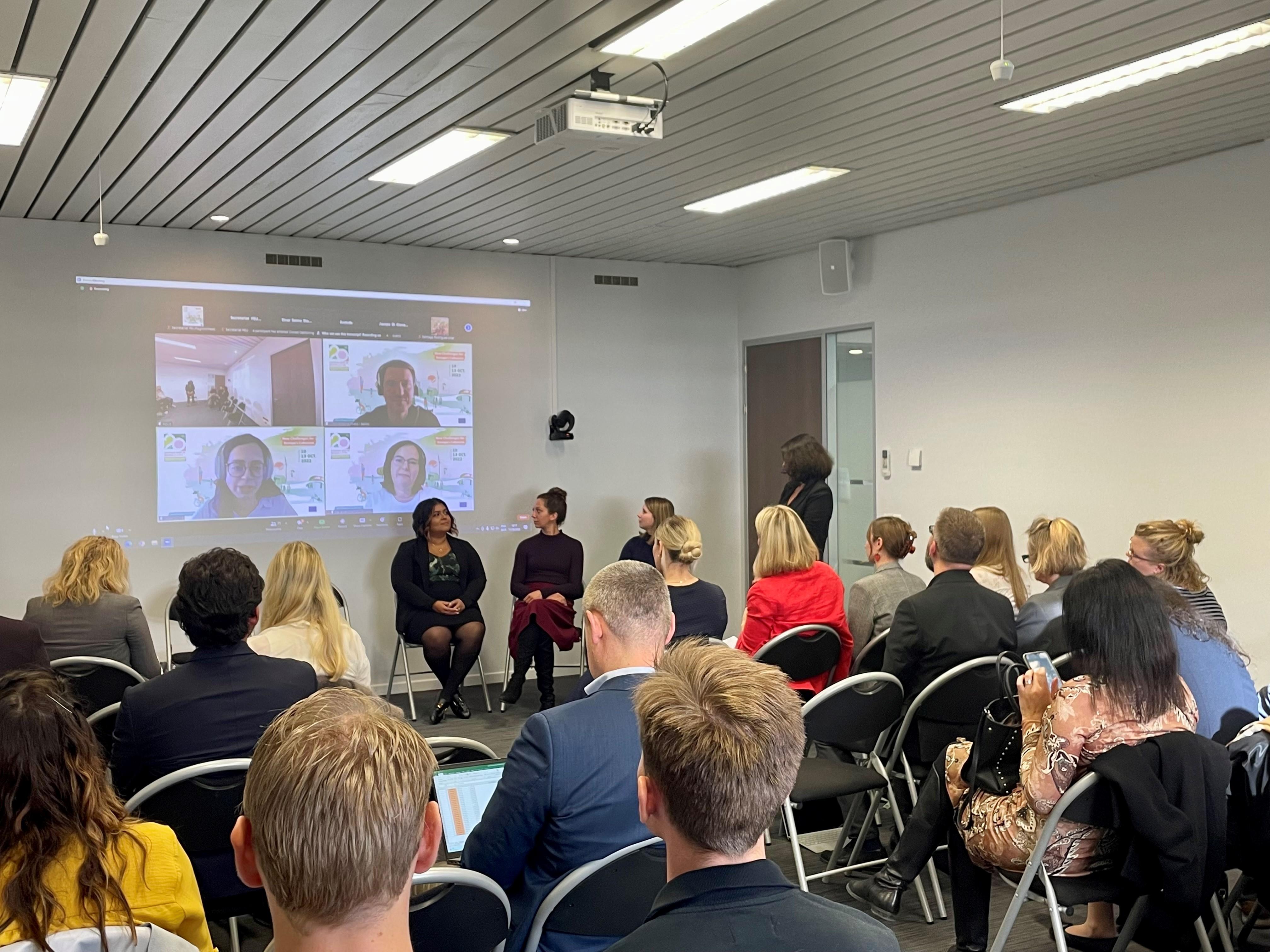
What is the future of Europe’s sustainable mobility strategy? Well, maybe ask our youth!
On 11 October, the ERRIN transport WG co-organised with POLIS network, Stavanger, Berlin, Turku and Ile de France regions, a panel as part of the European Week of Regions and Cities. The event discussed how young people’s voices can be elevated in the future of sustainable urban mobility and how our future transport systems can cater to their needs.
Across a unique panel of experts, young representatives and decision-makers, the future of Europe’s sustainable mobility strategy was debated.
This event, “Youth engagement in the green transition”, was part of European Week of Regions and Cities, which explored shared challenges for Europe's regions and cities, capacity-building, learning, and fed into the debate on EU cohesion policy.
Together, representatives from the European Commission, regions, cities and the next generation explored how and why Europe’s young people are- and must- take a lead role in our journey towards climate neutrality.
The European Commission has marked 2022 as the European Year of Youth. Europe needs the vision, engagement and participation of all young people to build a better future that is greener, more inclusive and digital.
This includes a rethinking of the urban mobility framework to make it more in line with the needs and priorities of youth.
“Citizen engagement is not easy, in the new urban mobility framework, we are pushing for this further, and this includes young voices,” said Isabelle Vandoorne, Deputy Head of Unit, research and innovation (urban mobility), DG-MOVE, European Commission.
“When we declare a European Year of, we are seeking to give a boost to certain areas and shift perspectives at EU scale,” said Laura Hetel, Policy Officer, leading on citizen engagement in the Cities Mission team, DG Research & Innovation, European Commission.
“The European Year of Youth is about changing the way we see young people and their role in policymaking. The message is clear: young people should be part of the debate and given concrete opportunities to make a difference in their communities.”
The event was a chance to explore how regions and cities, including Stavanger, Berlin, Turku and Ile de France, are putting youth mobility first, with young people guiding their climate and mobility strategies.
Ile de France has more than 42 million journeys each day, with their public transport card for young people, they are making transit cheaper and facilitating easier access to carsharing and carpooling options. This is critical for areas of the region where public transit does not hold such extensive coverage.
Indeed, the young representatives stressed the importance of thinking beyond the urban core- towards the functional urban area and focusing on young families, to ensure that alternative transport achieves as broad coverage as possible.
“We need to support those living outside of the city,” said Marte Weberg Skipnes, Stavanger’s Climate Ambassador, a city whose Youth ticket provides young people with access to all modes of transport for under 30 euros per month.
Indeed, when it comes to sustainable modal choices, it pays to start transport users young!
“If we are to achieve truly long-term sustainable mobility, it is important to provide engagement at various stages of life, from kindergarten to teenage years and further education, as well as young family, to reinforce and support sustainable travel behaviours- which will carry on into later life,” asserted Jenny Hostland, Transportation Planner.
Young people as decision makers
However, it was clear we can go further- engaging young people across decision-making too.
“I appreciate the initiatives for prioritising access to transport for youth, but we need to continue to think how we continue to build on this,” said Isabel Bezerra da Cunha, doctoral student in Spatial Planning, University of Porto.
“We can establish youth advisory boards, internships, open forums- it needs to be more comprehensive and durable,” suggested Sheba Nair, Doctoral researcher at Tampere University.
Indeed, Turku is regularly interacting with school parliaments, particularly around issues of active travel, to ensure strategies are designed for and with young people. These youth parliaments are not just present alongside policymakers, they are able to participate in the city’s main decision-making bodies.
“Internships are really great tools, they have supported us with securing new inputs and viewpoints, this can also be used by cities!” agreed Victor Borsche, Managing Director of Theo- who shared how young people are shaping the future of last mile delivery- as sector which projects 78% increase in demand by 2030.
Indeed, this built on discussions at Urban Mobility Days, held in Brno in September, where the concept of “Youth Mayors” was even posed.
“Young people can be the ambassadors of some of the new mobility solutions, they ask questions adults sometimes do not ask,” agreed, Kateřina Kührová, Masters student, University of Graz.
Youth engagement in the Climate Neutral Cities Mission
Citizen engagement has been present across the Climate-Neutral and Smart Cities Mission, and Laura Hetel examined how young people have a part to play in the mission.
“We are talking about full-scale city transformation. We cannot achieve this without involving citizens – including youth – in their multiple roles as political actors, users, consumers and investors” she asserted.
This Mission aims to support 100 European cities to become climate-neutral by 2030, establishing them as experimentation and innovation hubs to put all European cities in a position to become climate-neutral by 2050. Urban mobility is a critical part of this journey. With the cities now selected, the hard work begins to find new and innovative ways to reduce greenhouse gas emissions. In the process, cities and their inhabitants will reap many co-benefits such as reduced air and noise pollution, less congestion, safer roads and more active lifestyles.
“As we look towards our 2030 and 2050 horizons, it is the youth here today who will need a seat at the table, now!” echoed Francoise Guaspare.
- Gaia Ialisa Marotta
- 13/10/2022
-
Working Group